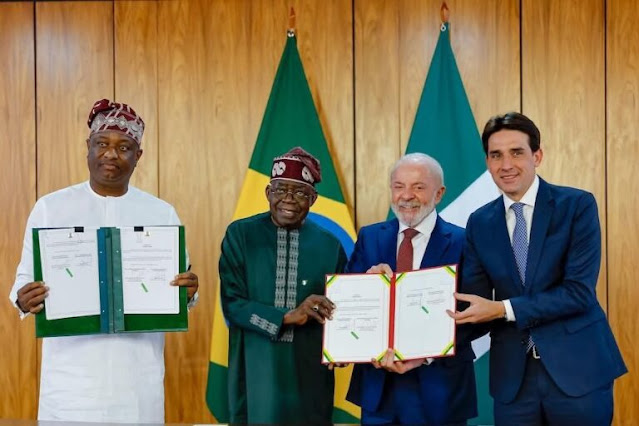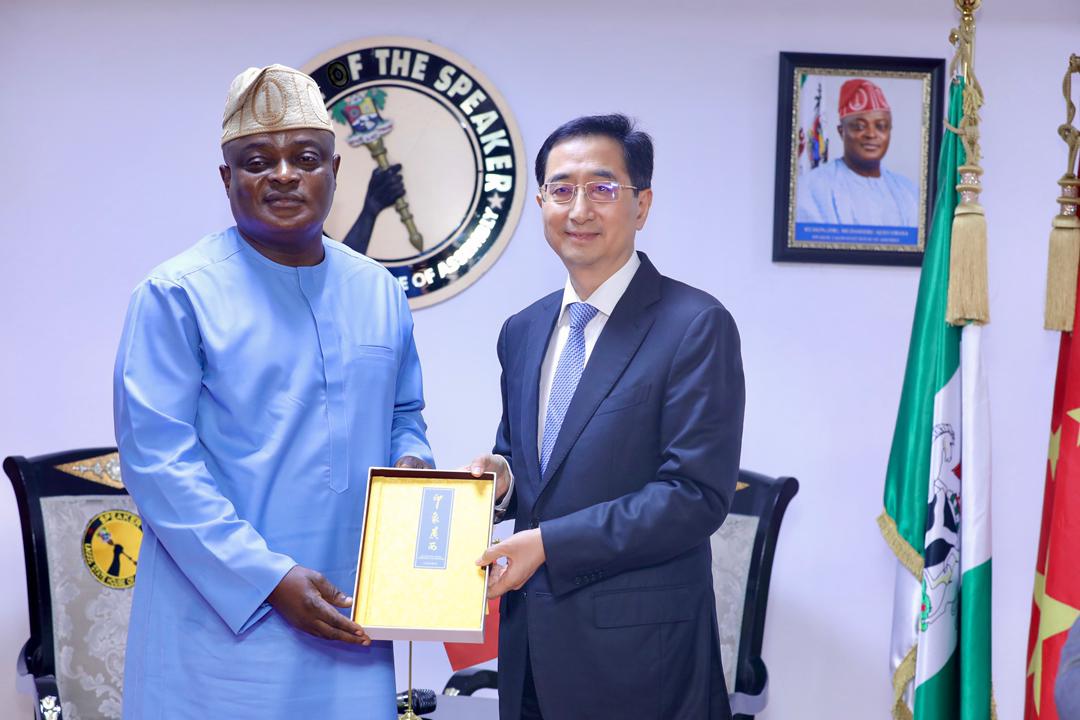In a significant step toward strengthening bilateral relations between Nigeria and Brazil, Nigeria’s largest airline, Air Peace, is set to launch direct flights from Lagos to São Paulo, marking a historic milestone in the deepening ties between the two nations. The agreement for this direct flight was a key outcome of a state visit by Nigerian President Bola Tinubu to Brazil, where he held productive discussions with his Brazilian counterpart, President Luiz Inácio Lula da Silva. The announcement, made during a joint conference at the Palácio do Planalto in Brasília, underscores the commitment of both leaders to enhance connectivity, boost trade, and foster people-to-people exchanges between their countries.
The introduction of the Lagos-São Paulo route by Air Peace is poised to transform travel and trade dynamics between Nigeria and Brazil, two of the largest economies in Africa and South America, respectively. By facilitating direct air travel, the initiative aims to reduce travel time, lower costs, and create new opportunities for economic and cultural collaboration. The agreements signed during President Tinubu’s visit, including the Bilateral Air Services Agreement (BASA) and several Memoranda of Understanding (MOUs), reflect a broader vision to strengthen cooperation in aviation, trade, agriculture, science, technology, and diplomacy.
A Historic Agreement for Direct Flights
During the joint conference, President Lula announced the approval of the direct flight route, to be operated by Air Peace, Nigeria’s leading airline. “Increasing the direct connections between Nigeria and Brazil is another essential step to strengthen the ties between our societies,” he stated. “We have approved the launch of a direct flight, to be operated by Nigeria’s largest airline company, Air Peace, between Lagos and São Paulo.” This announcement was met with enthusiasm, as it represents a significant leap forward in fostering closer ties between the two nations.
Currently, travel between Nigeria and Brazil often requires multiple layovers, typically in Europe, the Middle East, or other African hubs, resulting in lengthy and costly journeys. The new direct flight will eliminate these inconveniences, offering a more efficient and affordable travel option for businesspeople, tourists, students, and families. By connecting Lagos, Nigeria’s commercial capital, with São Paulo, Brazil’s economic powerhouse, the route is expected to facilitate increased trade, tourism, and cultural exchanges, while also strengthening the bonds between the Nigerian and Brazilian diasporas.
Air Peace, known for its extensive domestic and regional network, has been a trailblazer in Nigeria’s aviation sector. The airline’s selection to operate this international route is a testament to its growing reputation and operational capacity. With a fleet of modern aircraft and a commitment to providing affordable and reliable air travel, Air Peace is well-positioned to make the Lagos-São Paulo route a success. The airline’s expansion into long-haul international routes also aligns with Nigeria’s broader goal of positioning itself as a key player in global aviation.
Strengthening Bilateral Ties Through Agreements
The announcement of the direct flight was one of several outcomes from President Tinubu’s state visit, which included a two-hour expanded bilateral meeting with President Lula. The meeting provided a platform for both leaders to discuss areas of mutual interest, including trade, investment, science, technology, and diplomacy. Following their discussions, the leaders witnessed the signing of multiple agreements and MOUs, each designed to deepen collaboration and drive mutual prosperity.
The cornerstone of the aviation-related agreements was the Bilateral Air Services Agreement (BASA), signed by Nigeria’s Minister of Aviation and Aerospace Development, Festus Keyamo, and Brazil’s Minister of Ports and Airports, Silvio Costa Filho. The BASA establishes a framework for cooperation in air transport, paving the way for the direct flight and future aviation partnerships. By promoting open skies and reciprocal rights for airlines from both countries, the agreement is expected to boost trade and people-to-people ties, creating a ripple effect across various sectors of the economy.
In addition to the BASA, the visit saw the signing of agreements in diplomacy, science, technology, and agriculture. Nigeria’s Minister of State for Foreign Affairs, Ambassador Bianca Ojukwu, and Brazil’s Minister of Foreign Affairs, Ambassador Mauro Vieira, signed an agreement on Diplomatic Training Cooperation. This agreement aims to enhance the capacity of diplomats from both countries through joint training programs, fostering a deeper understanding of bilateral and international issues. The ministers also signed an MOU on political consultations, which will facilitate regular dialogue on bilateral, regional, and global matters of common interest.
In the realm of science and technology, Nigeria’s Minister of Innovation, Science, and Technology, Geoffrey Nnaji, and Brazil’s Minister of Science, Technology, and Innovation, Luciana Santos, signed an MOU on cooperation in biotechnology, bioeconomy, ocean science, innovation ecosystems, energy, space development, digital transformation, and raw materials research. This comprehensive agreement reflects the shared commitment of both nations to leverage cutting-edge technologies for sustainable development. By collaborating on areas such as biotechnology and digital transformation, Nigeria and Brazil aim to address pressing challenges such as food security, climate change, and economic diversification.
The agricultural sector also received significant attention during the visit. The Managing Director of Nigeria’s Bank of Agriculture, Ayo Sotinrin, and Brazil’s Minister for the National Bank for Economic and Social Development (BNDES), Aluísio Mercadante, signed an MOU for cooperation on trade and investment promotion. This agreement focuses on harmonizing efforts to expand agricultural financing, investment, and joint projects, recognizing the critical role of agriculture in both economies. Nigeria, with its vast arable land and growing population, stands to benefit from Brazil’s expertise in agribusiness and agricultural technology, while Brazil can tap into Nigeria’s burgeoning market for agricultural products.
Economic and Social Implications
The launch of the direct flight from Lagos to São Paulo is expected to have far-reaching economic and social implications for both Nigeria and Brazil. Economically, the route will facilitate increased trade by reducing the time and cost of transporting goods and services between the two countries. Nigeria and Brazil are both major players in their respective regions, with Nigeria being Africa’s largest economy and Brazil a leading economic power in South America. The direct flight will enable businesses to explore new markets, forge partnerships, and expand their operations, contributing to economic growth and job creation.
The trade potential between Nigeria and Brazil is significant, given their complementary strengths. Nigeria is a major producer of oil, gas, and agricultural products, while Brazil is renowned for its expertise in agribusiness, renewable energy, and manufacturing. The direct flight will make it easier for Nigerian exporters to access Brazilian markets and for Brazilian companies to invest in Nigeria’s growing economy. Sectors such as agriculture, energy, and technology are likely to see increased collaboration, driven by the agreements signed during the visit.
From a social perspective, the direct flight will strengthen people-to-people ties by making it easier for Nigerians and Brazilians to visit each other’s countries. Cultural exchanges, educational collaborations, and tourism are expected to flourish as travel becomes more accessible. Nigeria and Brazil share a rich cultural heritage, with historical ties rooted in the transatlantic slave trade and shared African influences in Brazilian culture. The direct flight will provide an opportunity for both nations to celebrate their shared history while building new connections through tourism, academic exchanges, and cultural festivals.
The Nigerian and Brazilian diasporas will also benefit from the direct flight. Many Nigerians live and work in Brazil, particularly in São Paulo, which hosts a vibrant African community. Similarly, Brazilian businesses and professionals are increasingly active in Nigeria, particularly in sectors such as agriculture and construction. The direct flight will make it easier for families, students, and professionals to maintain ties with their home countries, fostering a sense of community and shared identity.
Air Peace’s Role in Global Aviation
Air Peace’s selection to operate the Lagos-São Paulo route is a significant achievement for the airline and a milestone in Nigeria’s aviation sector. Founded in 2014, Air Peace has grown rapidly to become Nigeria’s largest and most successful airline, operating a fleet of modern aircraft and serving destinations across Africa and beyond. The airline’s expansion into long-haul international routes, such as the Lagos-São Paulo flight, reflects its ambition to compete on the global stage and position Nigeria as a key player in international aviation.
The direct flight also aligns with Nigeria’s broader aviation strategy, which seeks to enhance connectivity, promote tourism, and boost trade. By operating the Lagos-São Paulo route, Air Peace will contribute to Nigeria’s goal of becoming a regional aviation hub, competing with established hubs such as Addis Ababa, Nairobi, and Johannesburg. The airline’s commitment to affordability and reliability will be critical in ensuring the success of the route, particularly given the high demand for cost-effective travel options between Africa and South America.
Challenges and Opportunities
While the launch of the direct flight is a cause for celebration, it is not without challenges. Operating a long-haul international route requires significant investment in aircraft, crew training, and operational infrastructure. Air Peace will need to navigate complex regulatory requirements, including compliance with international aviation standards and bilateral agreements. The airline will also face competition from established carriers operating indirect routes between Nigeria and Brazil, which may offer lower fares or more frequent flights.
Logistical challenges, such as securing landing slots at São Paulo’s busy Guarulhos International Airport and managing fuel costs, will also need to be addressed. Additionally, Air Peace will need to invest in marketing and awareness campaigns to ensure that the route attracts sufficient passengers to be commercially viable. Collaboration with tourism boards, trade organizations, and diaspora communities in both Nigeria and Brazil will be essential in promoting the route and maximizing its impact.
Despite these challenges, the opportunities presented by the Lagos-São Paulo route are immense. The direct flight will open up new markets for Nigerian and Brazilian businesses, facilitate academic and cultural exchanges, and strengthen diplomatic ties. By reducing travel time and costs, the route will make it easier for entrepreneurs, students, and tourists to explore opportunities in both countries, fostering a deeper sense of partnership and collaboration.
A Broader Vision for Nigeria-Brazil Relations
The agreements signed during President Tinubu’s visit reflect a broader vision for Nigeria-Brazil relations, one that transcends aviation and encompasses cooperation in science, technology, agriculture, and diplomacy. The MOUs on biotechnology, digital transformation, and agricultural financing highlight the shared priorities of both nations, including food security, sustainable development, and economic diversification. By leveraging Brazil’s expertise in agribusiness and Nigeria’s vast agricultural potential, the two countries can address pressing challenges such as hunger and poverty while creating new opportunities for growth.
The agreement on diplomatic training cooperation and political consultations underscores the importance of dialogue in addressing regional and global issues. Nigeria and Brazil, as leading voices in Africa and South America, have a unique opportunity to collaborate on issues such as climate change, trade liberalization, and global governance. By fostering regular consultations and capacity-building programs, the two countries can strengthen their diplomatic ties and amplify their influence on the international stage.
Conclusion
The launch of the direct Air Peace flight from Lagos to São Paulo is a historic milestone in Nigeria-Brazil relations, marking a new era of connectivity, trade, and cultural exchange. The agreement, reached during President Tinubu’s state visit to Brazil, reflects the shared commitment of both nations to deepen their partnership and drive mutual prosperity. By facilitating direct air travel, the route will make it easier for Nigerians and Brazilians to connect, collaborate, and explore new opportunities, while also boosting trade and tourism.
The broader agreements signed during the visit, including the BASA and MOUs on science, technology, agriculture, and diplomacy, demonstrate the multifaceted nature of Nigeria-Brazil cooperation. These initiatives, driven by visionary leadership and private sector innovation, have the potential to transform both economies and create lasting benefits for their citizens. Air Peace’s role in operating the Lagos-São Paulo route underscores Nigeria’s growing influence in global aviation and its commitment to fostering connectivity across continents.
As Nigeria and Brazil look to the future, the direct flight and accompanying agreements serve as a foundation for a stronger, more vibrant partnership. By building on this momentum, both nations can unlock new opportunities for growth, innovation, and collaboration, paving the way for a brighter and more prosperous future.






